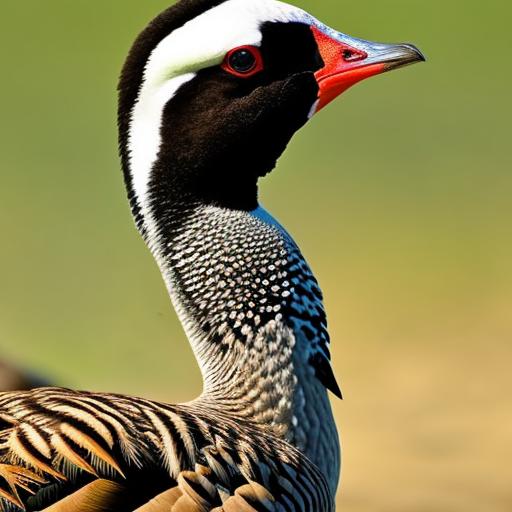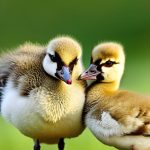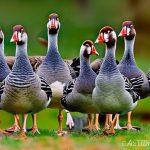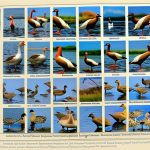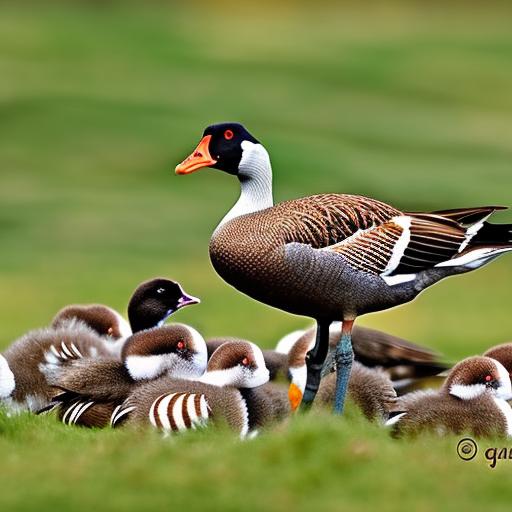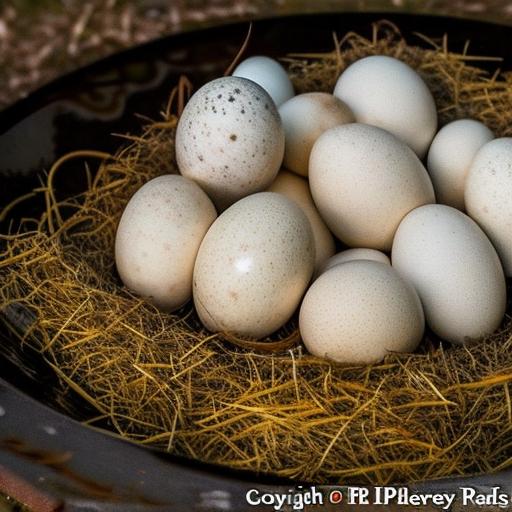Key Takeaways
- African geese are a popular breed known for their gentle nature and excellent egg-laying abilities.
- Understanding the physical and behavioral characteristics of African geese is crucial for successful breeding.
- Selecting breeding pairs with good health, temperament, and genetic diversity is essential for producing healthy goslings.
- Providing adequate housing and enclosure, including access to water for swimming, is important for the well-being of African geese.
- Proper nutrition, including a balanced diet and access to fresh water, is vital for the health and fertility of breeding African geese.
Introduction to African Geese
African geese, also known as Embden geese, are a large breed of domestic geese that originate from Africa. They are known for their impressive size, distinctive appearance, and hardy nature, making them a popular choice for both commercial and hobby farmers. Responsible breeding practices are crucial for maintaining the health and well-being of African geese. This guide aims to provide comprehensive information to help aspiring and experienced breeders achieve successful African goose breeding.
African geese are known for their large size, with adults typically weighing between 12 to 20 pounds. They have a distinctive white plumage with a prominent orange beak and feet, as well as a prominent knob on their forehead. African geese are generally docile and calm, making them well-suited for both commercial and backyard settings. They are known to be excellent foragers and can thrive in a variety of environments, from pastures to small-scale farms.
Responsible breeding practices are essential for the long-term sustainability of the African goose breed. By selecting healthy and genetically diverse individuals, providing appropriate housing and nutrition, and implementing proper incubation and rearing techniques, breeders can ensure the continued success and well-being of their African goose flocks.
Understanding the Characteristics of African Geese
African geese are known for their impressive physical traits and unique behavioral characteristics. Their large size, distinctive appearance, and hardy nature make them a popular choice among both commercial and hobby farmers.
The physical characteristics of African geese are truly remarkable. Adults typically weigh between 12 to 20 pounds, making them one of the largest breeds of domestic geese. They have a striking white plumage that is complemented by their prominent orange beak and feet, as well as a distinctive knob on their forehead. This unique appearance is a testament to the breed’s African heritage and contributes to their overall appeal.
In terms of behavior, African geese are generally docile and calm, making them well-suited for a variety of settings. They are known to be excellent foragers and can thrive in a range of environments, from lush pastures to small-scale farms. This hardy nature and adaptability make African geese a popular choice for both commercial and backyard operations.
Understanding the physical and behavioral characteristics of African geese is crucial for breeders who aim to maintain the health and well-being of their flocks. By recognizing the unique traits of this breed, breeders can make informed decisions about housing, feeding, and breeding practices to ensure the continued success of their African goose operations.
Selecting Breeding Pairs for African Geese
Selecting the right breeding pairs is a critical step in successful African goose breeding. Breeders must carefully evaluate the health, genetics, and maturity of potential breeding individuals to ensure the long-term viability of their flocks.
When choosing breeding pairs, it is essential to select healthy, unrelated individuals to maintain genetic diversity and prevent inbreeding. Breeders should carefully assess the physical characteristics, temperament, and health history of potential breeding pairs to ensure they are well-suited for the breeding process. By prioritizing genetic diversity, breeders can help to safeguard the overall health and resilience of their African goose flocks.
Considerations for breeding age and maturity are also crucial. African geese typically reach sexual maturity around 1 to 2 years of age, but it is recommended to wait until the birds are at least 2 years old before breeding. This allows the geese to fully develop both physically and mentally, ensuring they are ready to engage in the breeding process and provide the best possible care for their offspring.
By carefully selecting healthy and genetically diverse breeding pairs, and allowing the geese to reach appropriate maturity, breeders can lay the foundation for successful African goose breeding. This attention to detail and responsible practices will help to ensure the long-term viability and well-being of the breed.
Housing and Enclosure Requirements for African Geese
| Aspect | Metric |
|---|---|
| Geese Breed | African Geese |
| Incubation Period | 28-34 days |
| Brooding Temperature | 95-100°F |
| Feeding | Start with 20% protein feed |
| Water | Provide clean water at all times |
Providing the right housing and enclosure for African geese is essential for their health, well-being, and breeding success. Breeders must ensure that their geese have ample space to move around, forage, and nest, while also offering secure and weatherproof shelter.
African geese require a significant amount of space to thrive. The enclosure should be large enough to accommodate the size and number of birds, with a minimum of 30 square feet per adult goose. This allows the geese to engage in their natural behaviors, such as foraging, swimming, and socializing, without feeling confined or stressed.
In addition to providing adequate space, breeders must also ensure that their African geese have access to a secure, weatherproof shelter. This shelter should protect the birds from the elements, such as wind, rain, and extreme temperatures, and offer a safe and comfortable environment for them to rest and nest. Nesting areas should be provided within the shelter, with soft bedding material such as straw or hay, to encourage natural nesting behavior.
By creating a housing and enclosure environment that meets the specific needs of African geese, breeders can support the overall health and well-being of their flocks. This, in turn, can contribute to the success of their breeding program and the long-term sustainability of the African goose breed.
Feeding and Nutrition for Breeding African Geese
Proper feeding and nutrition are crucial for the health and breeding success of African geese. Breeders must provide a balanced diet that meets the specific nutritional requirements of their breeding geese, and adjust their feeding practices during the breeding season to support egg production and overall well-being.
Breeding African geese require a diet that consists of a combination of grains, greens, and protein-rich feeds, such as cracked corn, oats, and alfalfa. This balanced diet provides the necessary nutrients for egg production, growth, and overall health. Breeders should carefully monitor the geese’s intake and adjust the feed as needed to ensure they are receiving the appropriate nutrients.
During the breeding season, it is important to increase the protein and calcium content in the geese’s diet to support egg production and shell formation. Breeders should also ensure that clean, fresh water is available at all times to support the geese’s hydration and overall well-being.
By providing a balanced and well-tailored diet, breeders can support the health and breeding success of their African geese. This attention to nutrition can contribute to the production of high-quality eggs, the development of healthy goslings, and the overall viability of the breeding program.
Breeding Cycle and Egg Incubation
Understanding the breeding cycle and proper egg incubation techniques is essential for successful African goose breeding. Breeders must be aware of the various stages of the breeding cycle and implement best practices for collecting, storing, and incubating the eggs to ensure optimal hatching success.
African geese typically begin their breeding cycle in the spring, with egg-laying and incubation occurring in the following months. Breeders should be familiar with the courtship, egg-laying, and incubation stages to ensure they can provide the necessary care and support throughout the breeding process.
Collecting and storing eggs properly is crucial for successful hatching. Breeders should handle the eggs with care, avoiding any cracks or damage, and store them in a cool, dry place until they are ready for incubation. During the incubation period, maintaining the correct temperature, humidity, and turning schedule is essential to ensure the best possible hatch rate.
By understanding the breeding cycle and implementing proper egg incubation techniques, breeders can maximize the success of their African goose breeding program. This knowledge and attention to detail can contribute to the production of healthy, viable goslings and the continued growth and sustainability of the breed.
Gosling Care and Rearing
Providing a secure and nurturing environment for newly hatched goslings is crucial for their growth and development. Breeders must be attentive to the specific needs of goslings and implement appropriate feeding and care practices to support their transition to adulthood.
Newly hatched goslings require a warm, draft-free environment with access to food and water. Breeders should closely monitor the goslings’ growth and development, ensuring they receive the necessary care and attention. This includes providing a specialized starter feed that meets the goslings’ unique nutritional requirements, as well as ensuring they have access to clean, fresh water.
As the goslings mature, their diet can be gradually transitioned to the adult feeding regimen. Breeders should be mindful of the goslings’ changing nutritional needs and adjust their feeding practices accordingly to support their continued growth and development.
By creating a secure and nurturing environment for goslings and implementing appropriate feeding and care practices, breeders can help ensure the successful rearing of their African goose offspring. This attention to the specific needs of goslings can contribute to the overall health and well-being of the flock, setting the stage for future breeding success.
Common Health Concerns and Preventative Measures
Maintaining the health and well-being of African geese is a critical aspect of successful breeding. Breeders must be aware of common health concerns and implement preventative measures to safeguard their flocks.
Common health issues in African geese can include parasites, respiratory infections, and foot problems. Breeders should be vigilant in monitoring their geese for any signs of illness or distress and take prompt action to address any health concerns. This may involve consulting with a veterinarian, implementing appropriate treatment protocols, and isolating affected birds to prevent the spread of disease.
In addition to addressing health issues as they arise, breeders should also focus on preventative measures to maintain the overall health of their African goose flocks. This includes regular veterinary check-ups, proper sanitation practices, and implementing vaccination protocols as recommended by veterinary professionals. By taking a proactive approach to health management, breeders can help minimize the risk of disease outbreaks and ensure the long-term well-being of their geese.
By staying informed about common health concerns and implementing effective preventative measures, breeders can safeguard the health and vitality of their African goose flocks. This commitment to responsible health management is essential for the success and sustainability of any African goose breeding program.
Tips for Successful African Goose Breeding
Breeding African geese requires patience, dedication, and a willingness to continuously learn and adapt. Breeders who are committed to the process and open to new knowledge and techniques are more likely to achieve successful outcomes.
Patience and dedication are key when it comes to breeding African geese. The breeding process can be time-consuming and may require adjustments along the way. Breeders must be prepared to invest the necessary time and resources to ensure the best possible results for their flocks.
Continuous learning and improvement are also essential for successful African goose breeding. Breeders should stay up-to-date with the latest research and best practices in the field, seeking out mentorship from experienced breeders and being open to feedback and new ideas. By continuously striving to improve their breeding practices, breeders can ensure the long-term viability and success of their African goose operations.
By approaching African goose breeding with patience, dedication, and a commitment to continuous learning, breeders can overcome challenges, adapt to changing circumstances, and ultimately achieve their goals. This holistic approach to breeding can contribute to the overall health, well-being, and sustainability of the African goose breed.
FAQs
What is the average lifespan of African geese?
African geese have an average lifespan of 10-15 years, although some individuals may live longer with proper care and nutrition.
At what age do African geese reach sexual maturity?
African geese typically reach sexual maturity at around 9-10 months of age, although this can vary between individuals.
How many eggs do African geese typically lay?
African geese can lay between 20-50 eggs per year, with peak laying occurring in the spring and early summer.
What is the incubation period for African goose eggs?
The incubation period for African goose eggs is approximately 28-34 days, with the female goose typically responsible for incubating the eggs.
What are the ideal breeding conditions for African geese?
Ideal breeding conditions for African geese include access to a secure nesting area, ample food and water, and minimal disturbances during the breeding season.
How can I encourage successful breeding in my African geese?
To encourage successful breeding, provide a balanced diet, a suitable nesting area, and minimize stress factors such as overcrowding or predator threats.
What should I consider before breeding African geese?
Before breeding African geese, consider the availability of space, time, and resources needed to care for the goslings and adult geese. Additionally, ensure that local regulations and ordinances allow for the keeping and breeding of geese.
Meet Walter, the feathered-friend fanatic of Florida! Nestled in the sunshine state, Walter struts through life with his feathered companions, clucking his way to happiness. With a coop that’s fancier than a five-star hotel, he’s the Don Juan of the chicken world. When he’s not teaching his hens to do the cha-cha, you’ll find him in a heated debate with his prized rooster, Sir Clucks-a-Lot. Walter’s poultry passion is no yolk; he’s the sunny-side-up guy you never knew you needed in your flock of friends!

